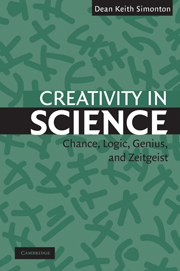Book contents
- Frontmatter
- Contents
- Preface
- Mathematical Notation
- Chapter 1 Introduction: Scientific Creativity
- Chapter 2 Creative Products
- Chapter 3 Combinatorial Processes
- Chapter 4 Scientific Activity
- Chapter 5 Creative Scientists
- Chapter 6 Scientific Discovery
- Chapter 7 Consolidation: Creativity in Science
- References
- Index
Chapter 2 - Creative Products
Published online by Cambridge University Press: 05 June 2012
- Frontmatter
- Contents
- Preface
- Mathematical Notation
- Chapter 1 Introduction: Scientific Creativity
- Chapter 2 Creative Products
- Chapter 3 Combinatorial Processes
- Chapter 4 Scientific Activity
- Chapter 5 Creative Scientists
- Chapter 6 Scientific Discovery
- Chapter 7 Consolidation: Creativity in Science
- References
- Index
Summary
Of the four major metasciences mentioned in the preceding chapter, the psychology of science has the deepest commitment to understanding scientific creativity. Yet, it should have become apparent that the psychology of science fails to provide a unified perspective on the phenomenon (Simonton, 2003b). In particular, while some practitioners adopt the logic perspective on the phenomenon, others embrace the genius perspective. The reason for this split is that scientific psychology actually consists of two distinct, even antagonistic disciplines (Cronbach, 1957). On the one side are experimental psychologists, who conduct laboratory experiments on the abstract human mind; on the other side are correlational psychologists, who study concrete differences among individual human beings. This split carries over into the psychology of science, the first looking at scientific discovery as a generalized logical process and the second investigating the personal attributes of outstanding scientists. Because the methods and aims are so disparate, the two research traditions find it difficult to agree on a common theoretical language to address the phenomenon. So the data generated by one tradition are often taken as irrelevant to the data generated by the contrary tradition. Thus, Mansfield and Busse's (1981) The Psychology of Creativity and Discovery, which represents the correlational tradition, virtually ignored the vast experimental literature on the subject. A more recent overview of scientific creativity contains not a single reference to laboratory experiments or computer simulations (Stumpf, 1995).
- Type
- Chapter
- Information
- Creativity in ScienceChance, Logic, Genius, and Zeitgeist, pp. 14 - 39Publisher: Cambridge University PressPrint publication year: 2004



